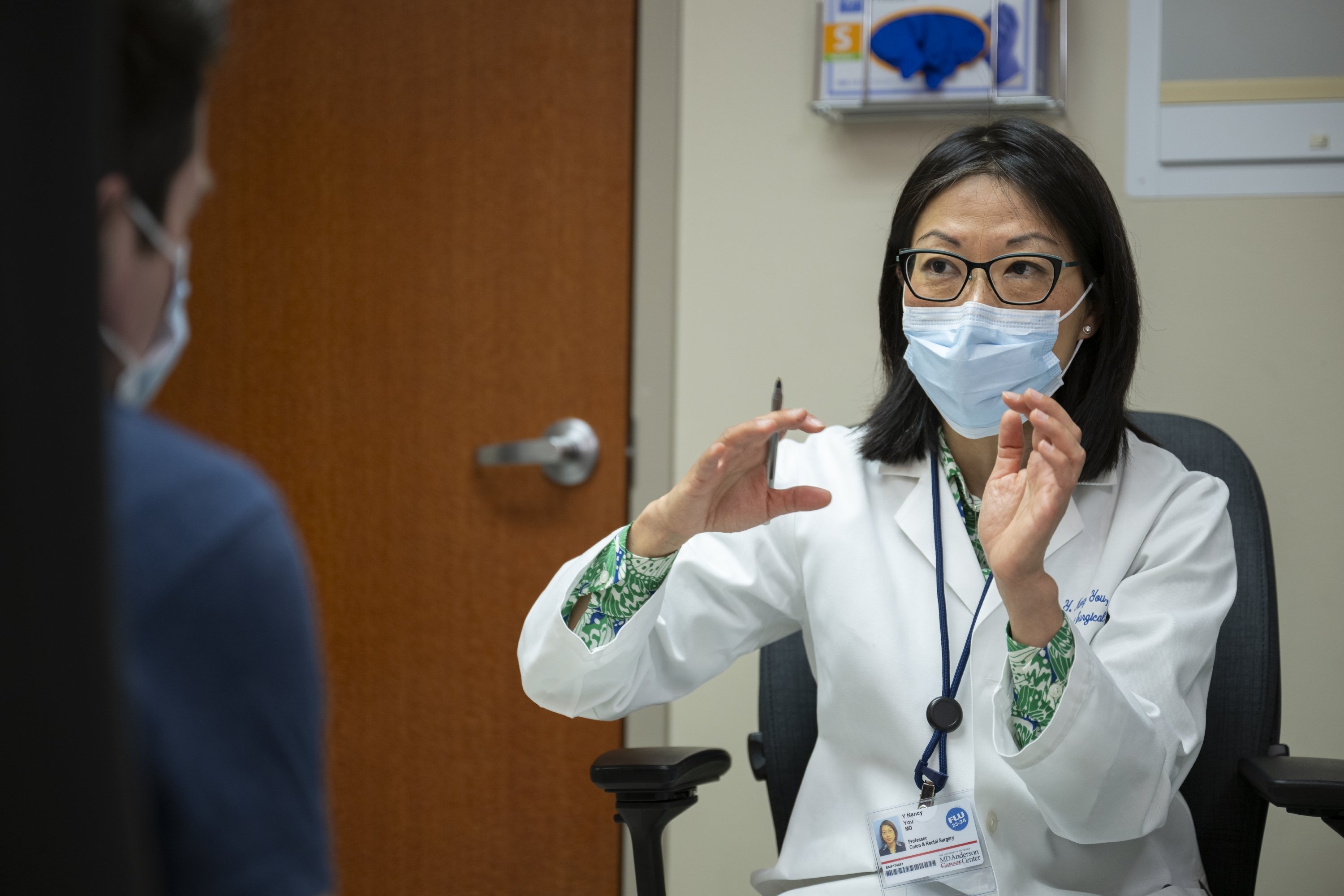- Diseases
- Acoustic Neuroma (14)
- Adrenal Gland Tumor (24)
- Anal Cancer (68)
- Anemia (2)
- Appendix Cancer (16)
- Bile Duct Cancer (26)
- Bladder Cancer (72)
- Brain Metastases (28)
- Brain Tumor (232)
- Breast Cancer (714)
- Breast Implant-Associated Anaplastic Large Cell Lymphoma (2)
- Cancer of Unknown Primary (4)
- Carcinoid Tumor (8)
- Cervical Cancer (160)
- Colon Cancer (166)
- Colorectal Cancer (118)
- Endocrine Tumor (4)
- Esophageal Cancer (44)
- Eye Cancer (36)
- Fallopian Tube Cancer (8)
- Germ Cell Tumor (4)
- Gestational Trophoblastic Disease (2)
- Head and Neck Cancer (14)
- Kidney Cancer (128)
- Leukemia (342)
- Liver Cancer (50)
- Lung Cancer (286)
- Lymphoma (278)
- Mesothelioma (14)
- Metastasis (30)
- Multiple Myeloma (100)
- Myelodysplastic Syndrome (60)
- Myeloproliferative Neoplasm (6)
- Neuroendocrine Tumors (16)
- Oral Cancer (100)
- Ovarian Cancer (172)
- Pancreatic Cancer (160)
- Parathyroid Disease (2)
- Penile Cancer (14)
- Pituitary Tumor (6)
- Prostate Cancer (146)
- Rectal Cancer (58)
- Renal Medullary Carcinoma (6)
- Salivary Gland Cancer (14)
- Sarcoma (238)
- Skin Cancer (296)
- Skull Base Tumors (56)
- Spinal Tumor (12)
- Stomach Cancer (64)
- Testicular Cancer (28)
- Throat Cancer (92)
- Thymoma (6)
- Thyroid Cancer (98)
- Tonsil Cancer (30)
- Uterine Cancer (82)
- Vaginal Cancer (18)
- Vulvar Cancer (20)
- Cancer Topic
- Adolescent and Young Adult Cancer Issues (20)
- Advance Care Planning (12)
- Biostatistics (2)
- Blood Donation (18)
- Bone Health (8)
- COVID-19 (362)
- Cancer Recurrence (120)
- Childhood Cancer Issues (120)
- Clinical Trials (632)
- Complementary Integrative Medicine (22)
- Cytogenetics (2)
- DNA Methylation (4)
- Diagnosis (232)
- Epigenetics (6)
- Fertility (62)
- Follow-up Guidelines (2)
- Health Disparities (14)
- Hereditary Cancer Syndromes (126)
- Immunology (18)
- Li-Fraumeni Syndrome (8)
- Mental Health (116)
- Molecular Diagnostics (8)
- Pain Management (62)
- Palliative Care (8)
- Pathology (10)
- Physical Therapy (18)
- Pregnancy (18)
- Prevention (920)
- Research (392)
- Second Opinion (74)
- Sexuality (16)
- Side Effects (608)
- Sleep Disorders (10)
- Stem Cell Transplantation Cellular Therapy (216)
- Support (402)
- Survivorship (322)
- Symptoms (182)
- Treatment (1786)
Young adults: Genetic counseling and testing for colorectal cancer
3 minute read | Published October 05, 2015
Medically Reviewed | Last reviewed by an MD Anderson Cancer Center medical professional on October 05, 2015
Recent reports show that colorectal cancer is on the rise in young adults, especially those younger than 40. And many of these cases are linked to genetic mutations.
The good news is that many colorectal cancer cases in young adults can be prevented with the help of genetic counseling and testing. Understanding your colorectal cancer risk can help you start taking steps to prevent cancer.
We spoke with Eduardo Vilar-Sanchez, M.D., Ph.D., assistant professor of Clinical Cancer Prevention, to find out more about genetic testing for colorectal cancer. Here's what he had to say.
Who needs genetic testing for colorectal cancer?
Any colorectal cancer patient younger than 50 should consider genetic counseling to evaluate the need for genetic testing. In addition, any colorectal cancer patient with a family history of cancer should consider genetic counseling for similar reasons.
You recently led a study that showed that one-third of colorectal cancers diagnosed before age 35 are hereditary. What's your advice for colorectal cancer patients and their immediate relatives based on the study's findings?
Based on the study's findings, you should ask to be referred to a genetic counselor if you have colorectal cancer and are age 35 or younger. The genetic counselor will review your family history and help determine if you need genetic testing.
Your immediate family members should wait until you receive your results before seeking genetic counseling or genetic testing.
What happens during genetic testing for colorectal cancer? How long does it take to get results?
Patients undergoing genetic testing have their blood drawn. This only takes a few minutes.
The blood will then be used for germline gene sequencing. This will show if you carry any germline mutation that could cause a hereditary syndrome that could lead to colorectal cancer, like Lynch syndrome or familial adenomatous polyposis (FAP).
You should receive your results four to six weeks after the test.
What is Lynch syndrome, and how common is it?
Lynch syndrome is a hereditary condition that increases a person's chances of developing colorectal cancer. About 3 to 5 percent of patients with colorectal cancer have Lynch syndrome. People with Lynch syndrome have a 50 to 80 percent chance of developing colorectal cancer. They also may be more likely to develop endometrial and ovarian cancers, small bowel and stomach cancer or urinary tract tumors.
What is familial adenomatous polyposis (FAP)? How common is it?
FAP is another hereditary condition. It causes an individual to develop hundreds to thousands of intestinal polyps. The lifetime risk of colorectal cancer for people with FAP is 100 percent. Usually, they develop colorectal cancer in their 30s. The majority of FAP patients need to have their colon removed to prevent colorectal cancer.
Less than 1% of people with colorectal cancer have FAP.
What are the next steps for people who undergo genetic testing and learn that they carry a genetic risk for colorectal cancer?
After discussing your genetic testing results with a genetic counselor or physician, you will get recommendations for your surveillance and preventive interventions. For many people, that means annual colonoscopies. For others, it may mean having the colon removed.
When should family members of colorectal cancer patients, as well as those with Lynch Syndrome and/or FAP, consider genetic testing?
If a patient has FAP, close family members should be tested early on, usually as teenagers. This is because colorectal cancer in patients with FAP tends to arise at a very young age.
If a patient has Lynch syndrome, family members can wait until they are about 20 to 25 years old to undergo genetic testing.
What can patients with other types of cancer do to lower their colorectal cancer risks?
Patients older than 50 should receive a colonoscopy, the gold standard of colorectal screening.
Another way to reduce your colorectal cancer risk is to modify your diet to make it balanced and rich in vegetables and limit red meat and processed meats.
Be sure to talk to your doctor about your family history and what you can do to reduce your personal risk of colorectal cancer.
Related Cancerwise Stories

Talk to your doctor about your family history and what you can do to reduce your personal risk of colorectal cancer.
Eduardo Vilar-Sanchez, M.D.
Physician





